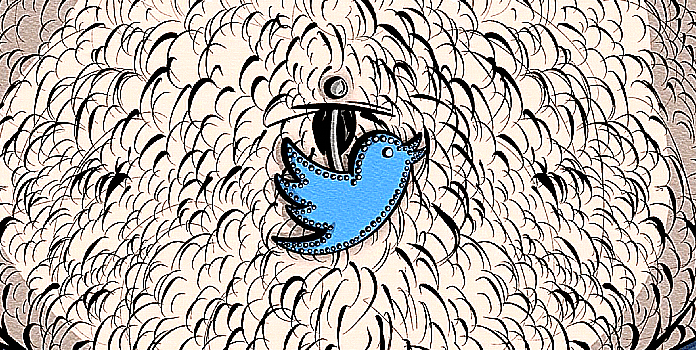(Ken Silva, Headline USA) A trial with grave First Amendment implications is set to begin this month, and will feature the testimony of an anonymous FBI informant who still may be operating conservative Twitter accounts.
The trial is of Douglas Mackey, who is accused of election interference for posting memes in 2016 about voting for then-presidential candidate Hillary Clinton via text message. Mackey had been operating the popular “Ricky Vaughn” Twitter account that had some 58,000 followers.
Mackey maintains that the memes were clearly satire, while the U.S. government claims his actions were designed to deprive individuals of their constitutional right to vote.
Testifying for the government will be an FBI informant who may still be operating anonymous right-wing Twitter accounts.
The informant’s existence was disclosed in recently unsealed records.
According to prosecutors, the informant operated an anonymous right-wing Twitter account similar to Mackey’s Ricky Vaughn account in 2016. The two worked together to disseminate misinformation on Twitter, but they never knew each other’s real identities, prosecutors said.
The informant pled guilty to the same charge currently facing Mackey, and will testify against him at trial. Prosecutors sought to protect the informant’s identify because the informant is still working with the FBI in ongoing investigations, they said.
“The [informant] is presently involved in multiple, ongoing investigations and other activities in which he or she is using assumed internet names and ‘handles’ that do not reveal his or her true identity,” prosecutors said.
Mackey’s defense attorney, Andrew Frisch, opposed the U.S. government’s request to keep the informant anonymous. Frisch argued in a March 2 filing that his client has a Sixth Amendment right to be confronted by the witnesses used against him.
While government argued that the informant may face online harassment if his identity were to be exposed, Frisch pointed out that Mackey has never engaged in criminal harassment or violent threats.
“[The informant] has guarded his anonymity for years not because he is afraid for his safety or his ability to work with the FBI, but because it would harm his reputation,” Frisch argued.
“The [informant] is assisting the government in its case against Mr. Mackey, and the government is incentivized to make the [informant’s] life more pleasant. The [informant] pled guilty to a felony and, according to the government, was a leader in the controversial ‘alt right’ movement, and was engaged in spreading disinformation, and leading online harassment campaigns.”
Frisch further argued that it’s important to reveal the informant’s identity for numerous reasons, including to discern whether the informant harbors political bias.
“While the defendant and [the informant] never met, they were both political conservatives, and the [informant] is now at odds against him. If the [informant’s] political views have changed significantly, it is relevant to understand his community and biases. If it turns out his work for the FBI is targeting other right-wing adherents, the defense needs to know so for the purpose of cross-examination,” Frisch argued in a motion filed March 2.
“If his political views have changed, the defense may wish to probe as to whether he has a political bias against the defendant. If his views have not changed, it is relevant to probe his motivations.”
However, U.S. District Judge Nicholas Garaufis ruled in the government’s favor last Wednesday, allowing the informant to testify anonymously. Rather than his real name, attorneys will refer to the informant by the account names he was using in 2016.
While the informant will testify anonymously, an expert witness for Mackey won’t testify at all.
Frisch informed the court Monday that his expert witness, University of Alabama political science professor George Hawley, had been contacted by the Southern Poverty Law Center ahead of the trial. An SPLC researcher had informed Hawley that he planned to publish an article about the trial that would include information about the professor.
“I also requested that [SPLC] not include Professor Hawley in [the] article at least until after Professor Hawley testifies … so as not to threaten the integrity of the trial. [SPLC] nonetheless insisted on publishing the article. Whether or not [SPLC’s] approach constitutes actionable wrongdoing, Professor Hawley has asked me to withdraw his name as a witness,” Frisch said on Wednesday.
“For these reasons, I have no choice but to request a short adjournment of trial so that I may endeavor to identify a replacement expert witness.”
Judge Garaufis delayed the trial, which had been set to begin this week, until at least Monday. The judge scheduled a hearing for Tuesday afternoon to discuss outstanding issues related to the trial. Jury selection has continued uninterrupted.
Ken Silva is a staff writer at Headline USA. Follow him at twitter.com/jd_cashless.

